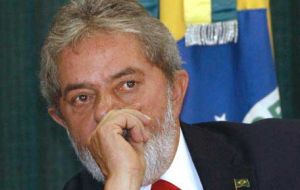MercoPress. South Atlantic News Agency
Lula calls on rich countries to advance global trade reforms
 Pte. Lula da Silva speaking at the World Economic Forum in Davos
Pte. Lula da Silva speaking at the World Economic Forum in Davos Brazilian President Luiz Inacio Lula da Silva made on Friday an impassioned plea to rich countries to assume their responsibilities in long-struggling global free trade talks helping to achieve a quick agreement.
Speaking at the World Economic Forum in Davos, Switzerland, Lula da Silva said it was up to the United States and Europe to tear down the barriers to farm trade that poor countries claim are preventing them from developing their economies. "If we wish to send a signal to the poorest countries on the planet that they will have an opportunity in the 21st century, it is necessary that the United States, Britain, France and Germany, that these countries should assume responsibility," he said. Lula da Silva insisted that if rich countries accept concessions, Brazil will comply with its share of responsibility and help convince the Group of 20 to act consequently, "proportionaly to their capacities". However the address avoided going into details of the global trade negotiations and comes a day before top trade negotiators from Brazil, the U.S., the 27-nation European Union and two dozen other countries are scheduled to meet on the sidelines of the World Economic Forum in an attempt to find a way forward in the Doha round talks. Lula da Silva, a regular guest at the Davos Forum said he had talked to U.S. President George W. Bush, French President Jacques Chirac and others about the necessity of completing the trade talks that were launched in 2001. "I didn't talk to God, because I think he's done enough for us already" added Lula da Silva in a light touch to an otherwise serious speech that also criticized the U.S. for the war in Iraq. The Doha talks have been stalled over clashes between rich and poor countries on slashing subsidies and tariffs, particularly for farm goods. The US and the EU have also been at loggerheads over agriculture support and export subsidies. "It is necessary that the U.S. and the EU reach an agreement because otherwise there's no agreement" underlined Lula da Silva. Negotiators are trying to forge the blueprint of a deal before July, when US President Bush's special authority from Congress to make trade deals expires. Without the so-called "fast track" authority, it would be much harder for any treaty to gain congressional approval in the U.S., the world's largest trading nation. Without Washington's inclusion, any global commerce deal would be meaningless. Lula da Silva said Brazil was prepared to do its part after rich countries give ground underlining that it is "necessary that the businessmen and women of the world should participate actively in convincing the rulers of the developed countries that it is necessary to reach an agreement". If no agreement is reached on the Doha round, "it can't be replaced by financial help to the poorest areas of the World", because it's only real possibilities of economic growth and investment "that can ensure us a freer and safer world, free of terrorism, drugs cartels and organized crime". But in spite of Lula da Silva's apparent leadership in the G 20, back in Brazil there's growing skepticism about the country's significance in a globalized world. In contrast to what happened in 2003 when Lula was a star during the Davos meeting, this year there seems to be very little interest in Brazil and the whole of Latin America. Charles Dallara, the managing director of the Institute of International Finance (IIF), commented: "There is less interest in Lula's visit this time, because all the attention of the emerging countries is turned to China and India, and Brazil is being left behind." For Dallara "the key for Brazil to accelerate its economy is tax reform, the reform of Social Security, a reduction of the government's role in the economy and a bigger opening". This week Lula da Silva announced a program to accelerate growth, PAC, during his second mandate to 2010 involving 245 billion US dollars mainly for infrastructure. However most of it will have to be supplied by the private sector and no word was mentioned about structural reforms demanded by the business community. For many world economists and leaders, the Brazilian package is not enough to promote sustainable growth. They would like to see structural reforms that would change the way Brazil taxes businesses and consumers, as well as reform the social security and the judicial system.




Top Comments
Disclaimer & comment rulesCommenting for this story is now closed.
If you have a Facebook account, become a fan and comment on our Facebook Page!